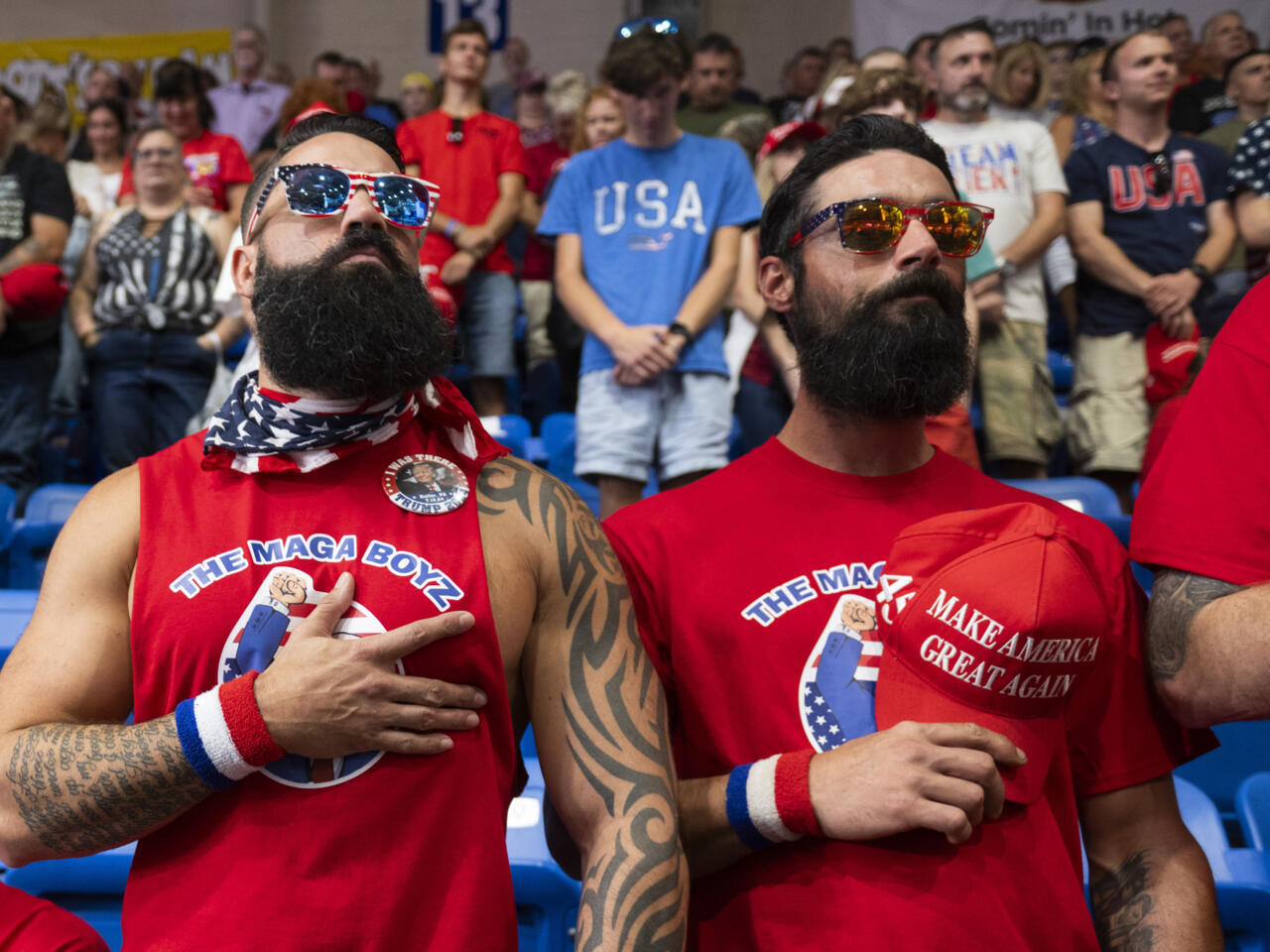In recent years, President Donald Trump has maintained a significant following among young male voters, particularly those aligned with the “MAGA Boyz” and online conservative meme communities. The rise of these groups has been largely fueled by social media, where memes and digital engagement serve as powerful tools for political messaging. This trend raises core questions about the way that masculinity, social identity, and political messaging intersect in driving the turnout of young voters.
Donald Trump’s appeal to young male voters is often attributed to his perceived embodiment of traditional masculinity. According to PerryUndem polling, “82 percent of Republican men say society today punishes men ‘just for acting like men’.” This sentiment is echoed by conservative influencers within the so-called “manosphere.” One supporter interviewed at a Trump rally, Passano, argues, “We have to set the tone in regards to what we want our children to emulate, which is strong masculine men. And he very much represents that.” This suggests that for many, Trump symbolizes a resistance to cultural shifts that they perceive as diminishing male identity and authority.
Moreover, Trump’s political rhetoric often capitalizes on the anxieties of young men who feel displaced in contemporary society. Niobe Way, a professor at New York University, explains, “They feel like they’ve been put on the bottom of the hierarchy, either as a working-class person, as a white person, as a boy—it doesn’t matter. They feel like they’ve been put on the bottom of the hierarchy of humanness. And they don’t want to be on the bottom.” This perceived marginalization has driven some young men away from progressive movements and toward conservative spaces that validate their grievances.
Social media has played an integral role in Trump’s sustained popularity among young men. The “MAGA Meme Pack,” an informal online collective, actively spreads viral pro-Trump content to engage young voters. One member explained the strategy: “It’s basically a vehicle to deliver a message. We’re gonna decentralize politics one meme at a time.” Memes allow conservative influencers to package political messages in “entertaining” ways, making them more appealing to younger audiences who primarily consume news and politics through social media platforms. Even the White House social media accounts have begun posting often demeaning “jokes” on their official pages.
This approach has proven effective. A Time-Siena poll of six swing states found that men ages 18 to 29 favored Trump by 13 points, while women of the same age group favored Vice President Kamala Harris by 38 points—a striking 51-point gender “chasm”. The ability of social media-driven narratives to mobilize young male voters is reshaping traditional electoral strategies and poses a significant challenge to Democratic outreach efforts.
Many young men who support Trump perceive progressive movements as hostile toward traditional masculinity. One young male supporter expressed frustration: “Modern-day BLM. Modern-day LGBTQ. Modern-day feminism. These things are meant to demoralize and go after men like us. Call us trash, call us monsters, saying that we’re what’s wrong with the world, when we’re the ones who built that world, and all of a sudden they want us to support them after what they’ve been calling us for the last 3 ½ years? I don’t think so.” Put bluntly, young men feel displaced from the traditional social order they thought they were entitled to by proxy of being male.
This increasing frustration with their exclusion from mainstream society, and what they perceive to be a hostile environment for manly men, had led to support for rightwing influencers and growing “alpha” mindsets. As WBUR’s coverage highlights, “Less of turning to the right and more turning away from the left.” The perception that progressivism is fundamentally anti-male has led many to embrace Trump as a form of resistance, rather than out of ideological loyalty.
While Democrats have successfully mobilized young female voters around issues such as reproductive rights, they have struggled to resonate with young men. The “whole abortion thing,” as one young conservative put it, was framed in the media in the context of an assault on reproductive rights, inadvertently alienating the young male voter who felt he had no dog in the fight. Furthermore, as political analyst Melissa Deckman suggests, “Democrats’ reluctance to struggle for policies which will advantage working-class guys” has pushed them away from this demographic. In contrast, Trump’s humor and outsider status are among his enduring appeals. Trump is a “Sigma,” according to conservative pundit JP Villasmil, a person who “goes against the grain, who plays by his own rules, but still conquers the game.” This characterization is consistent with Trump’s image as a renegade leader, appealing to young men who feel disenfranchised by modern social norms.
The rise of the “MAGA Boys” and meme-driven political engagement speaks to the new face of American electoral politics. Trump’s appeal to young male voters is deeply rooted in cultural and identity politics, rather than purely ideological conservatism. As progressives continue to struggle with messaging that resonates with the demographic, conservative influencers have successfully tapped into young men’s frustrations and disillusionment. Whether this trend will translate into increased Republican votes remains uncertain, but one thing is clear: social media has irrevocably altered how political allegiances are formed and upheld in the age of the internet.
Other posts that may interest you:
- Hollywood’s Obsession with ‘Strong Female Leads’ Is Missing the Point
- Sensationalism versus Sensitivity: Femicide Representation in Media
- Changes in Stardom and Parasocial Bonds in the Age of Instant Fame
- In Critique of “Sheep and Shepherd” Mentality
Discover more from The Sundial Press
Subscribe to get the latest posts sent to your email.





